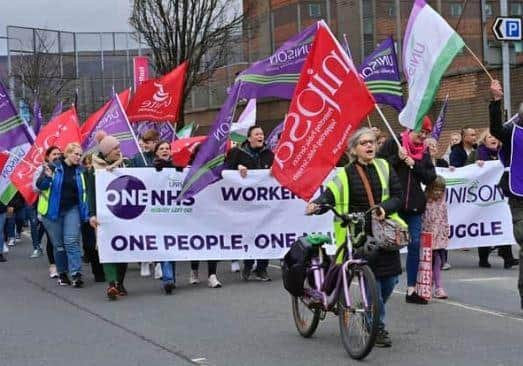January 18 strike: planned industrial action to cause ‘widespread disruption’
and live on Freeview channel 276
Thousands of workers across professions including health and social care, education, public transport, roads, forestry, rivers, ferries and PSNI staff are to strike in a dispute over pay.
Union representatives have stated there are plans for extensive picket lines at all the acute and community main health facilities. Education Authority school-based and headquarter staff will also mount pickets.
Advertisement
Hide AdAdvertisement
Hide AdIn advance of the “unprecedented” action, the Department of Health (DoH) has issued an appeal to the public.


In a statement the Department said: “While every effort will be made to mitigate the impact on the public, there will be widespread disruption to all aspects of health and social care services. This is expected to impact across a wide range of areas including planned and unplanned (urgent/emergency) hospital services, community services such as day centres, district nursing and domiciliary care as well as ambulance cover.
“Trusts will work with trade union representatives to seek to protect emergency care. We nevertheless believe that disruption to services will be on a scale not experienced with previous industrial action.
“We would therefore ask the public to be very conscious of the fact that a significantly reduced health service will be in place on January 18. This would mean not just delays over and above existing levels, but some services not being available at all.
Advertisement
Hide AdAdvertisement
Hide Ad“Please use services appropriately and help ensure care is available to those who need it most. Take all sensible steps to reduce your chances of requiring health service treatment on the day. At the same time, if you need emergency hospital care on the day, you must seek it immediately.”
The DoH statement went on to say it is very aware of the “deep frustration” of health service staff at the ongoing absence of a pay offer for this year.
It added: “We also understand that this frustration is further compounded by indications that funding for public sector pay increases is potentially available. Under the current 2023/24 health budget, it has not yet been possible for the Department to make a pay offer to HSC staff. That situation is neither sustainable nor defensible and cannot hold indefinitely.”
Unions say the coordinated strike action by public sector workers is set to be the biggest in the history of Northern Ireland and is focused on achieving pay improvements as well as ensuring pay parity, where relevant, with public sector workers in Great Britain.
Advertisement
Hide AdAdvertisement
Hide AdUnite general secretary Sharon Graham stated: “This will be an unprecedented demonstration of the power of workers in Northern Ireland. Unite will not allow the livelihoods of workers and the funding of public services to be used as a bargaining chip by this government.”
Anne Speed, UNISON’s head of bargaining and representation, commented: "There won’t be a workplace that is not affected next week. Indeed, in all of the major towns, big and small, workers will be stepping out to demand pay justice. They are fed up to the back teeth with low pay and no pay increases that are due to them.”
Harry Hutchinson, chairperson of the Mid Ulster Trade Union Council, claimed the province will be at a “standstill” during the day of strike action.
He added: "This general strike has materialised due to years of public sector pay cuts, none more so than the previous year, with pay cut by around half inflation.
“Lack of a living wage and relentless working pressure is causing a workers to move abroad. Workers must now demand control of their services and run by democratically elected workers committees.”